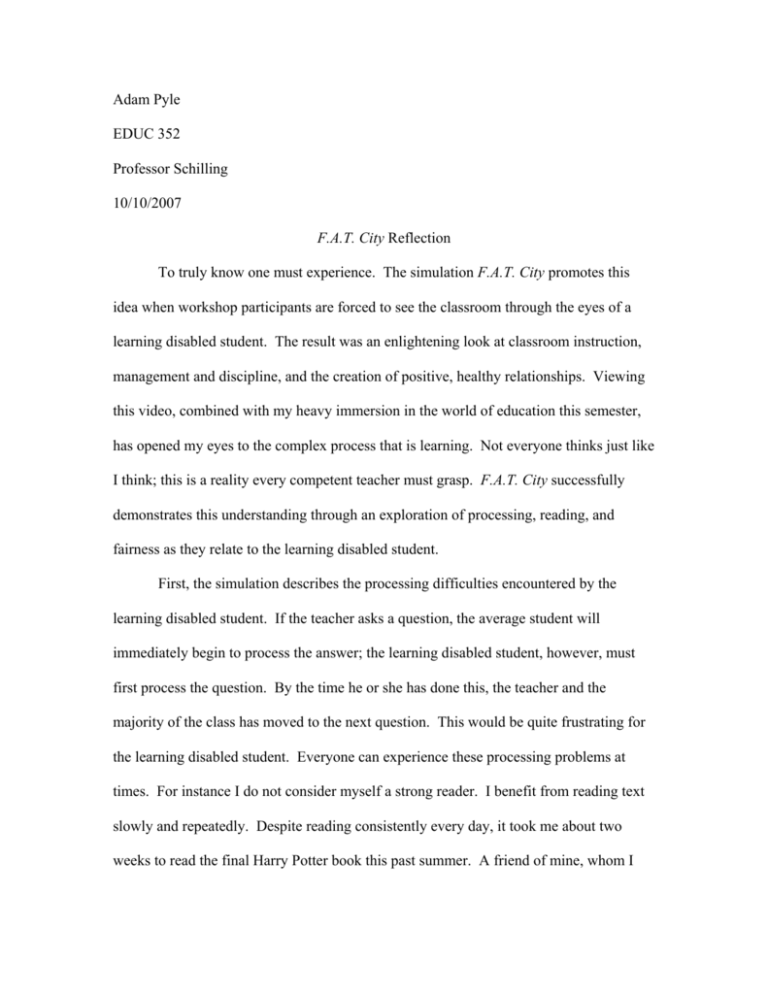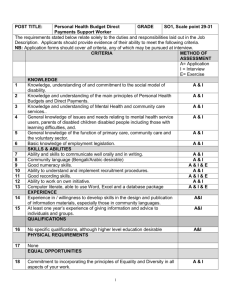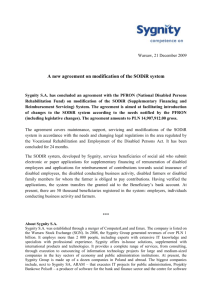F.A.T. City Reflection
advertisement

Adam Pyle EDUC 352 Professor Schilling 10/10/2007 F.A.T. City Reflection To truly know one must experience. The simulation F.A.T. City promotes this idea when workshop participants are forced to see the classroom through the eyes of a learning disabled student. The result was an enlightening look at classroom instruction, management and discipline, and the creation of positive, healthy relationships. Viewing this video, combined with my heavy immersion in the world of education this semester, has opened my eyes to the complex process that is learning. Not everyone thinks just like I think; this is a reality every competent teacher must grasp. F.A.T. City successfully demonstrates this understanding through an exploration of processing, reading, and fairness as they relate to the learning disabled student. First, the simulation describes the processing difficulties encountered by the learning disabled student. If the teacher asks a question, the average student will immediately begin to process the answer; the learning disabled student, however, must first process the question. By the time he or she has done this, the teacher and the majority of the class has moved to the next question. This would be quite frustrating for the learning disabled student. Everyone can experience these processing problems at times. For instance I do not consider myself a strong reader. I benefit from reading text slowly and repeatedly. Despite reading consistently every day, it took me about two weeks to read the final Harry Potter book this past summer. A friend of mine, whom I would consider a very strong reader, finished it two days after its release and then called me every day for a week to see if I had finished it. My slower processing of the material forced me to answer no each time. This same friend, however, would hesitate when asked to add eight and twelve. I can see in her face that she is processing questions detailing how to start, what twelve might look like, and how to finish the addition process. This is a question with which I would have no struggles. My slow reading is a constant source of frustration; my friend has many times expressed a desire to do math more quickly. Now think about the learning disabled student who is continually frustrated. He or she will likely give up in schoolwork, creating a downward spiral in which improvement is never seen. The effective teacher must be careful not to mistake this frustration for a lack of motivation. The teacher can help the student overcome difficulties by developing instruction and assessment that is inclusive, engaging, and inspiring. In addition to the issue of processing, the simulation also explored the trouble of reading for a learning disabled student. This particular experiment was well done. The participants were asked to look at two groups of words; one group contained familiar words and the other appeared to include nothing more than nonsense. When the more customary words were used in a sample of text, the workshop members could not follow what they had read. However, the participants handled comprehension of the text with the imaginary words quite well. The point is that decoding does not equal comprehension. I noticed this truth with elementary students when I was a member of Indiana Reading Corps last semester. When I read with a few first-grade students, I noticed that they were able to say most of the words in the book they were reading. However, based on their reading style, I suspected that they would have no idea what was actually happening in the story. When I worked with third-grade students, I noticed the opposite circumstances. The students would struggle while reading the book. Yet they were more than ready to answer any questions about what they had read. Obviously everyone wants to master both decoding and comprehension. Yet the classroom teacher must understand that they are not the same. If a student struggles to read aloud, it does not mean that reading comprehension has completely gone out the window. The successful teacher would choose to highlight this strength of the student’s reading capabilities in an effort to develop the techniques of decoding. Finally the simulation stressed a new definition of fairness. If asked to define fairness, I would have previously given the definition that is more customary: everyone gets the same treatment. However, the leader of the workshop emphasizes a different take on fairness where everyone gets what he or she needs. The learning disabled student gets assistance where the general classroom student may not. This is a need of the learning disabled student; it is not a need of the non-learning disabled student. When I was going through school, classmates used to leave the classroom to take tests in the resource room. Without having any idea what was happening in the resource room, I assumed that answers were simply being fed to these students without any effort on their part. I may have even said that that was not fair to me and fellow classmates. My ignorance has since been corrected. Using the F.A.T. City definition of fairness, now I understand that the learning disabled students were only having their needs met, needs other students do not have. Meeting those needs eliminates the frustration, anxiety, and tension a learning disabled student experiences. Frustration comes from the daily struggles encountered in the classroom. Anxiety exists because of a child’s need to feel accepted by the teacher and peers. Tension is the result of a misinformed teacher. The goal of fairness is the alleviation of these factors that no child should experience in school. Through an investigation of processing, reading, and fairness as they are experienced and pertain to the learning disabled student, F.A.T. City is a clear demonstration that not everyone thinks on the same levels. The way one person approaches his or her learning may produce great bouts of frustration and anxiety for someone else. My greatest fear as a prospective teacher is meeting students to whom I cannot explain mathematics. At least F.A.T. City makes me aware that an initial lack of production in the classroom is not necessarily the result of poor motivation or a blatant disregard for the material. This can only help as I develop instruction and assessment.







